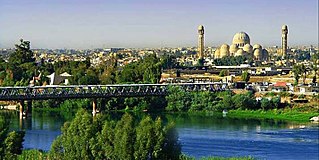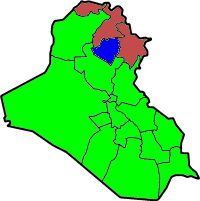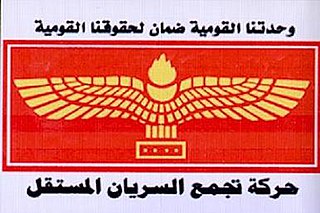Iraq is a federal parliamentary representative democratic republic. It is a multi-party system whereby the executive power is exercised by the Prime Minister of the Council of Ministers as the head of government, the President of Iraq as the head of state, and legislative power is vested in the Council of Representatives.

Kirkuk Governorate or Kirkuk Province is a governorate in northern Iraq. The governorate has an area of 9,679 square kilometres (3,737 sq mi). In 2017, the estimated population was 1,259,561 people. The provincial capital is the city of Kirkuk. It is divided into four districts.

Nineveh or Ninawa Governorate is a governorate in northern Iraq. It has an area of 37,323 km2 (14,410 sq mi) and an estimated population of 2,453,000 people as of 2003. Its largest city and provincial capital is Mosul, which lies across the Tigris river from the ruins of ancient Nineveh. Before 1976, it was called Mosul Province and included the present-day Dohuk Governorate. The second largest city is Tal Afar, which has an almost exclusively Turkmen population.

The Iraqi Turkmen Front is a political movement representing the Iraqi Turkmen people. It was founded on April 5, 1995 as a coalition of several Turkmen parties operating within the framework of Iraq's unity. The party aims for the Turkmen community to have greater political involvement, increased recognition and more rights.

Kurdistan Region (KRI) is a semi-autonomous administrative division in the Republic of Iraq. It comprises four Kurdish-majority governorates of Arab-majority Iraq: Erbil Governorate, Sulaymaniyah Governorate, Duhok Governorate, and Halabja Governorate. It is located in northern Iraq, which shares borders with Iran to the east, Turkey to the north, and Syria to the west.
The first government of Iraq led by Prime Minister Nouri al-Maliki took office on May 20, 2006 following approval by the members of the Iraqi National Assembly. This followed the general election in December 2005. The government succeeded the Iraqi Transitional Government which had continued in office in a caretaker capacity until the new government was formed and confirmed.

The Kurdistan Regional Parliament, also known as Kurdistan Parliament - Iraq, or simply Perleman, is the parliament of the Kurdistan Region in Iraq. It is made up of representatives from the various parties, lists or slates that are elected every four years by the inhabitants of Kurdistan Region, which is currently governed by the Kurdistan Regional Government. In 2009 an amendment was applied to the Kurdistan Election Law of the year 1992, changing the name of the body to Kurdish Parliament from its previous name: the Kurdish National Assembly.

Governorate or provincial elections were held in Iraq on 31 January 2009, to replace the local councils in fourteen of the eighteen governorates of Iraq that were elected in the 2005 Iraqi governorate elections. 14,431 candidates, including 3,912 women, contested 440 seats. The candidates came from over 400 parties, 75% of which were newly formed.

Parliamentary elections were held in Iraq on 7 March 2010. The elections decided the 325 members of the Council of Representatives who would elect the prime minister and president. The elections resulted in a partial victory for the Iraqi National Movement, led by former Interim Prime Minister Ayad Allawi, which won 91 seats, making it the largest alliance in the Council. The State of Law Coalition, led by incumbent Prime Minister Nouri Al-Maliki, was the second largest grouping with 89 seats.
The Baghdad governorate election of 2009 was held on 31 January 2009 alongside elections for all other governorates outside Iraqi Kurdistan and Kirkuk.
The Basra governorate election of 2009 was held on 31 January 2009 alongside elections for all other governorates outside Iraqi Kurdistan and Kirkuk.

The Nineveh Governorate election of 2009 was held on 31 January 2009 alongside elections for all other governorates outside Iraqi Kurdistan and Kirkuk Governorate.

The Kurdistan Region Governorate Council elections of 2005 were held on 31 January 2005, to coincide with the Iraqi legislative elections of January 2005 and the Kurdistan Region legislative elections of January 2005. The elections were held to choose 41 council members for each of the three governorates of Kurdistan Region, that is Dahuk, Erbil and Sulaymaniyah governorates. During the election, the Patriotic Union of Kurdistan (PUK) won a plurality of the votes, however, the Kurdistan Democratic Party (KDP) won a plurality of the council seats.

Governorate or provincial elections were held in Kirkuk Governorate in 2009 to replace the governorate council elected in the 2005 Iraqi governorate elections. The remaining governorates outside Iraqi Kurdistan held elections on 31 January 2009.

Governorate or provincial elections are due to be held in Arbil Governorate in 2009 to replace the governorate council elected in the Iraqi governorate elections of 2005. The remaining governorates outside Iraqi Kurdistan held elections on 31 January 2009. The election will follow the 2009 Iraqi Kurdistan legislative election.

Governorate or provincial elections are due to be held in Sulaymaniya Governorate in 2009 to replace the governorate council elected in the Iraqi governorate elections of 2005. The remaining governorates outside Iraqi Kurdistan held elections on 31 January 2009. The election will follow the 2009 Iraqi Kurdistan legislative election.

The Syriac Assembly Movement, formerly known as the Syriac Independent Gathering Movement, is an Assyrian political party from Iraq. The party's membership comprised mostly Assyrian Christians, particularly those who belonged to the Syriac Catholic community, and to a lesser extent those of the Syriac Orthodox Church.

Governorate or provincial elections were held in Iraq on 20 April 2013, to replace the local councils in the governorates of Iraq that were elected in the Iraqi governorate elections of 2009. Elections took place in 12 of Iraq's 18 governorates. Elections didn't take place in the 3 governorates forming the Kurdistan Region or Kirkuk, Anbar, or Nineveh, meaning that a total of 378 provincial council seats were up for election.

Governorate or provincial elections were scheduled to be held in Iraq on 20 April 2020, to replace the provincial councils in the governorates of Iraq that were elected in the 2013 Iraqi governorate elections and, in Kurdistan Region, in the 2014 elections. The elections were delayed indefinitely in November 2019, amidst demonstrations demanding the end of the existing political system.
The Kurdistani Coalition or Kurdistan Alliance Party is an electoral coalition founded by the major Kurdish parties of Kurdistan Region to run in the next Iraqi governorate elections. The coalition will run in the disputed areas between Iraq and Kurdistan Region and Baghdad Governorate to consolidate Kurdish votes. A total of 96 candidates will run as part of the coalition.












